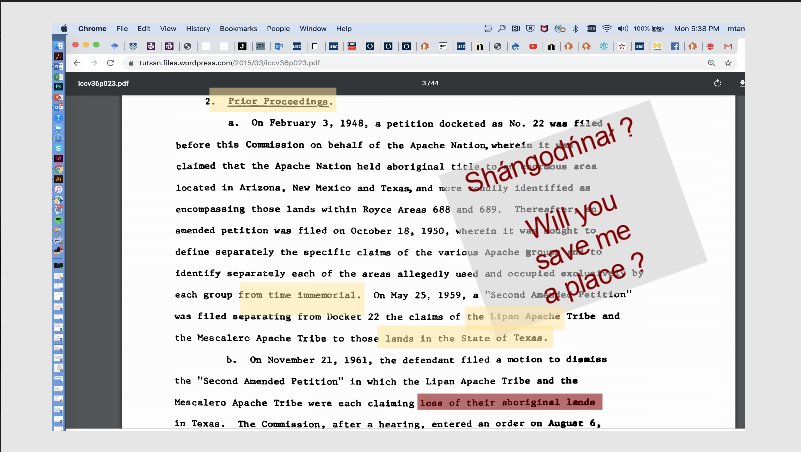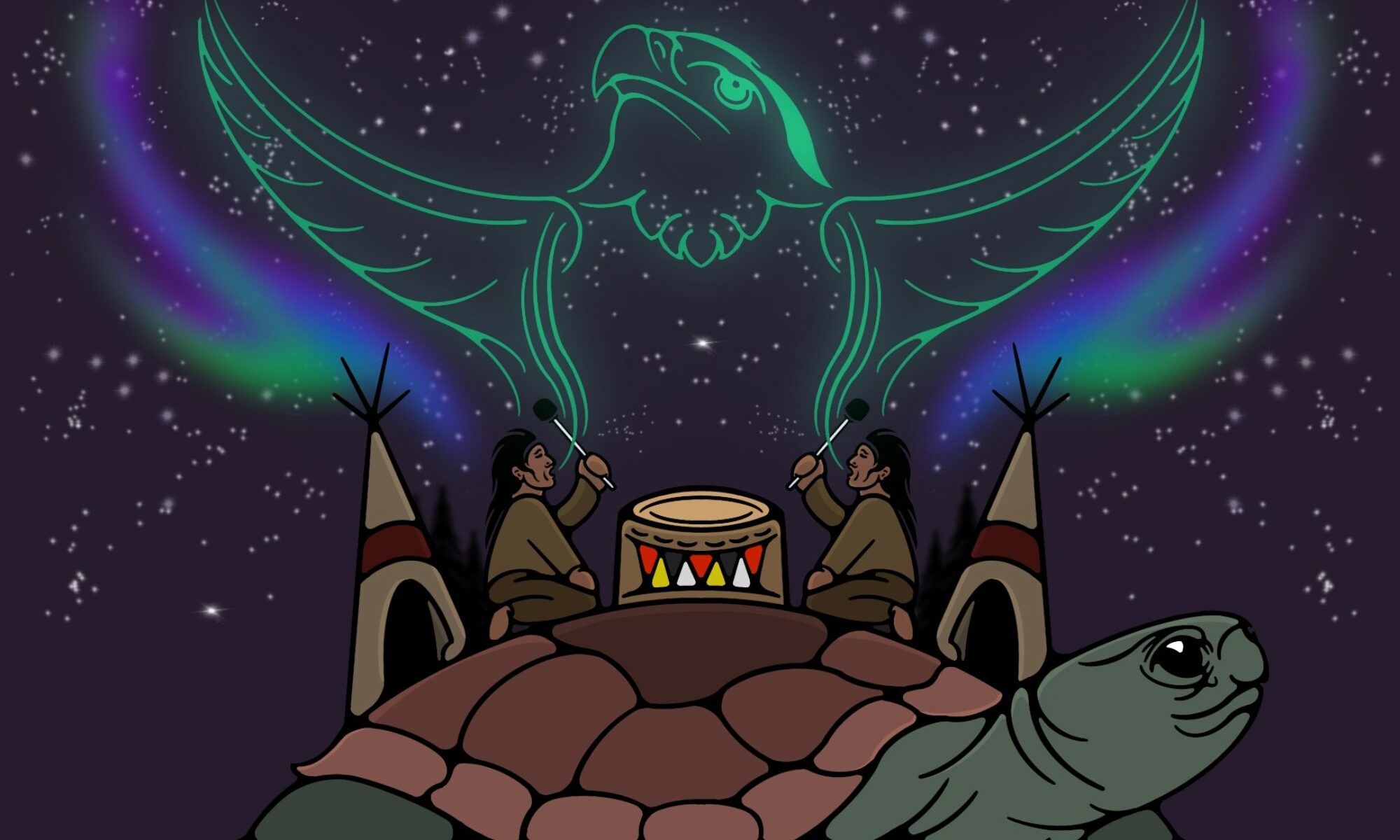
© Original poems, excerpted from Father | Genocide: New and Selected Work, 2009-2019, a new book-in-progress by Margo Tamez
If you prefer to read the PDF, click here
Dá’íhééneezį’é
dádn’áo.
Daádííjí.
Dádíí
dáá’koh jeekíí dádidlohgoh beeshá’íí’áná
I am thankful
when the sun rises.
This day.
Just this day
the woman danced until sunset.
✷
Yénáaałniiná
Ílatsoi
Yénáałni
wos’haaałts’
mit’ii
bits’ísí
Ts’ídáshá’íí’áo
nááyiiskáo dáá’koh
t’áji’yé
ndádaadeezáná
gokíyaa’í bich’í’yégoh
After a while
hummingbird
she remembered
dislocated shoulder
her spine
her body.
Just at evening
the next day
the movement back
was begun
toward their country.
✷
Gokíyaa
shighah
shighazhááí
Sháná’ńgeeh
this country
is my home
my little house.
bring it back for me.
✷
Shángodńnał ?
Dáhichagoh
ókaanándah
ghwóch’ííłdéłná
Will you save me
a place?
Though they cried
and pleaded,
they were abandoned.
✷

Father replays the funeral in Dream #28
Published in Poets.org. Eduardo Corral, curator.
Shame forces what we denied into luminosity.
In dream my father tells me my mother’s grieving
prevents momentum.
He’s projecting thoughts to a screen for me to read.
I’m at his private film of captivity.
He’s watching us. We’re hunched over heaving the sorrow vomit.
Father stands before me
time without fear suspended and apart
unafraid of anything one way or another.
“When did they cut it?” he wants to know
pushing the thought into space between my eyes.
Raising his pant leg where the mortician
smoothed and stretched the salvage skin Father used for padding
his below-knee amputation
hovering inches above the ground glints in his eyes.
He doesn’t remember the amputation
in the bending.
Father shows me his whole leg. Scars
mended and smooth.
He is an uncut body again. Like before the bending place.
Only the graft scars on his thighs remain.
He projects: “I feel my leg here Margo my foot still itches here” Father
points: “in this empty space” he twirls his fingers a slow spiral.
I nod to him: “I see. I’ll remember this for you.”
Artist Statement
At a very young age, I suffered a severe hearing impairment brought on by a runaway fever, poverty, and the intergenerational effects of colonization. At the time, there wasn’t the capacity to know if there was mass interest in the effects of the industrial chemical colonization of the air, land, water, and food systems in which I was raised in southern Texas and in the Texas-Mexico bordered region.
Early on, I made linkages between the settler society’s broad disrespect for and war against the Earth and the aggression we experienced as the local, non-recognized, Indigenous peoples. I didn’t have the language for this then; though, I was gaining intuitive knowing about how the oil-cattle-cotton and extraction economies trickled down toxicity to my body and how illness resulted.
Being Indigenous, poor, from non-recognized Ndé Dene peoples of Kónitsąąíígokíyaa, (aka: Southern Plains Lipan Apaches from the Big Water Country; unceded Aboriginal Title lands in current-day Texas), this also meant that my experiences, understandings, and critique of these interconnections were also linked to difficult histories spoken, or expressed nonverbally, amongst adult family members. Poetics of repressed memory, knowledge, and anxiety about our subjugated and invisible class (non)identity and (non)recognized political personhood raged into the 20th century:
through new Indigenous battle-grounds
waged inside cramped rental houses,
low-wage neighborhoods, school yards,
job sites, compulsory CCD catechism
classes, athletic indoctrinations, Sunday
mass, and public schools with White teachers
and rulers, and rule-line paper, and ruling glares.
through compulsory Brownie and Girl Scout
regimentation, yellow school bus rides, armed check points,
vehicle searches, identity papers, incomplete homework,
after school detention, signed yellow slips from home,
parents feeling contained in the rule-lined signature line
for their compulsory signing without consenting, that I
am a bad person for telling our people’s version of history,
compulsory silence in classrooms, compulsory seating order
at the back, with another Native and a Black girl,
curfews, canned corn, old tortillas stuck in
frozen wax paper, Halloween stereotypes, hard leather shoe
blisters, jumped by a gaggle of white boys managing
the settler racial architecture of space and place.
First grade in the occupied territory of unceded Lipan Apache homelands,
South Texas.

My work relates my life-long interest in language, history, archives, memory, and Ndé Dene peoples’ resistances and refusals to disappear and go away. My work also engages where and how Ndé Dene peoples have become conditioned into submission to settler supremacy, and where the colonizer’s methods embedded into the colonized. My work, as a truthing instrument, leans toward healing and revitalizing, by way of uncovering the hidden in order for truth to emerge; in order to purpose that which has been hidden and negated to be a vehicle for recovering Ndé Dene peoples’ spirits, well-being, and futurity beyond the non-persons we are imagined to be by colonizers which includes Indigenous peoples. Difficult knowledge and peace building have been core to my art, thinking, and process.
“Difficult knowledge and peace building have been core to my art, thinking, and process.”
By recognizing that genocide—for Ndé Dene peoples—has intricately involved diverse actors and polities, Indigenous genocide in southern Texas has demanded that poetry ascend to different places and strongly opposes genocide being used as a metaphor, or a generic, abstract descriptor. Genocide is an area of research, developed amongst contemporary Ndé Dene scholars, specific and located within groups of my family and kinship society, my immediate ancestors (embodied in the last four generations, between 1872-2019), as well as specific to sites/places of terror, crisis, violence, atrocity, brutality, indignity to the human body, and organized erasure in Kónitsąąíígokíyaa.
In my work, I engage different ways of knowing (epistemology), historicizing, ethics, and valuing to inform my methodology and creative methods to imagine and construct poetry which gives form and voice to non-recognized Indigenous nations. I reference my research on the state, state actors, bystanders, and specific Indigenous polities, organizations and institutions which have contributed to the process of obstructing Ndé Dene peoples’ access to justice. Poetry is a vital form to address histories and voices relegated as disposable and abject.
The cultural, physical, social, and political personhood of peoples of Kónitsąąíígokíyaa is persistently denied in US society into the present. Being deeply involved in three legal cases, between 2007 to 2013, which firmly rejected the state’s normative myth-making regarding US and bystander complicity in perpetuating genocide acts in Ndé Dene peoples’ unceded and Aboriginal Title lands (Texas) during the violent border wall conflict (2007-2009), I find poetry a useful and dynamic tool for stimulating imagery, animating truth-telling, making space for non-western language and knowledge systems, and igniting fire underneath the sedated and numbed consciousness of US-American society.
As a researcher and scholar, I am an archive builder, curator, and papers manager for two branches of Ndé Dene peoples’ historical documents and culturally related objects. In my current projects am making crucial links between Ndé Dene peoples’ difficult knowledge and state power as warehoused within officially sanctioned archives as an important subject for, (currently updated figures), 400 non-federally recognized Indigenous nations whose political personhood and land claims cases are subjected to multiple forms of human rights violations committed in the US today with the sanction of the federal government, state actors, as well as numerous federally recognized political actors today. This is untenable and is a major motivation in my production in and across poetry, visual arts, language activism, theory, and Indigenous rights advocacies.
The subject in these poems shared with the Siwar Mayu online publication is persistent genocide denial, negation, and obfuscation. As well, I’m interested in exploring the roles and memory of bystanders, beneficiaries, and obstructers to the Ndé Dene peoples’ experiences. I’m exploring Ndé Dene historical memory of complicated emotions connected to being forced by the state and its legal institutions, to helplessly witness the US and other tribal polities take control over unceded Ndé Dene peoples’ homelands. My engagement in Ndé Dene language recovery is a crucial act of honoring my ancestors—the genocide survivors and the non-survivors—and a loving act of reclaiming Ndé Dene peoples’ political, cultural, spiritual, and physical belonging with Kónitsąąíígokíyaa, our customary and traditional homeland. By doing so, the poems re-energize the Ndé Dene peoples’ self-determination and larger belonging amongst the Dene Nation. In poetry, the Ndé Dene peoples ascend to identity beyond the legal subjugated status of ‘Apache’, which is the legal synonym for the settler state’s normalizing genocide as an act of settler state sovereign impunity and immunity from accountability, redress, or recognizing responsibility. These things are hinged and interlocking; not separate.
“The memories of Ndé Dene peoples remain within me through my deep familial bonds and connections with a significant and large kinship society which spans Niguusdzán (North America).”
The memories of Ndé Dene peoples remain within me through my deep familial bonds and connections with a significant and large kinship society which spans Niguusdzán (North America). By recovering and decolonizing the legal archives, and re-purposing Ndé Dene language revitalization, I (re)visit intimate familial places in Lipan Apache (Ndé) homelands, in South Texas, eastern New Mexico, and northeastern Mexico. My ancestors’ spatial time-bending emplaces a pictorial language, helping me decipher historical violence felt by Ndé Dene of Texas.
My poetry acknowledges and draws attention to the lingering impacts of historical trauma which saturate Ndé Dene storied landscapes still obscured by aggressive settler colonial erasure. Spirit memory as sentience, landguage, place, despair—the collective internalization of Indigenous spatial exile—influence my understanding of my peoples’ refusal to settle for the abjection we’re experiencing still today as a result of the genocide politics of perpetrators and bystanders. These poems, echoing post-memory of Ndé intergenerational genocide survivors, explores how historical memory of violence disturbs linear settler literary, history, and narrative structures which have denied Ndé Dene peoples our lived experiences, knowledge, and homelands—even after death. My poetry, inter-ribboned with Ndé Dene peoples’ perspectives of herstory and law, emphatically position different realities, existences, and outcomes which the Ndé Dene peoples will into being.—Margo Tamez
MORE ABOUT MARGO TAMEZ
Margo Tamez: Native American Writers
